Last Updated on June 29, 2025 by Irshad Quadri
High Cholesterol? Gluten-Free & Plant-Based Diet to Keep Your Heart Healthy!
- Is high cholesterol causing you to compromise your health?
- Or are you confused between gluten-free bread and healthy foods?
- Don’t worry! You can follow a tasty, plant-based, gluten-free diet that will not only lower your cholesterol level but also make your heart healthy. Also we’ll share gluten-free food for vegetarians to reduce cholesterol in this article.
Through this guide, we will tell you:
- How you can include such foods in your diet that are cholesterol lowering and also taste great.
- Tips for making delicious plant-based gluten free meals. – Simple, nutritious recipes to make boring and bland gluten-free diet exciting.
About High Cholesterol:
- A common health issue that has become a concern for many people.
- Nowadays people are giving importance to plant-based foods in their diet because they are naturally heart-friendly.
If you follow vegetarian and gluten-free diet:
- A little planning is necessary so that you can get tasty and nutritious meals.
- Gluten-free vegetarian foods have a lot to offer – high fiber, healthy fats, and plant-based proteins which help control cholesterol.
In this guide you will find:
- How to make delicious plant-based gluten-free meals that are beneficial for your heart.
- Easy, tasty recipes that will make you feel guilt-free.
You only have to choose the right foods:
- High fiber gluten-free vegetarian foods
- Healthy fats
- Cholesterol lowering recipes
Prioritize your health, and enjoy this journey!
- So, get ready for a healthy lifestyle!
- Your healthy life starts here!
Let’s start – your happy, healthy life starts here!
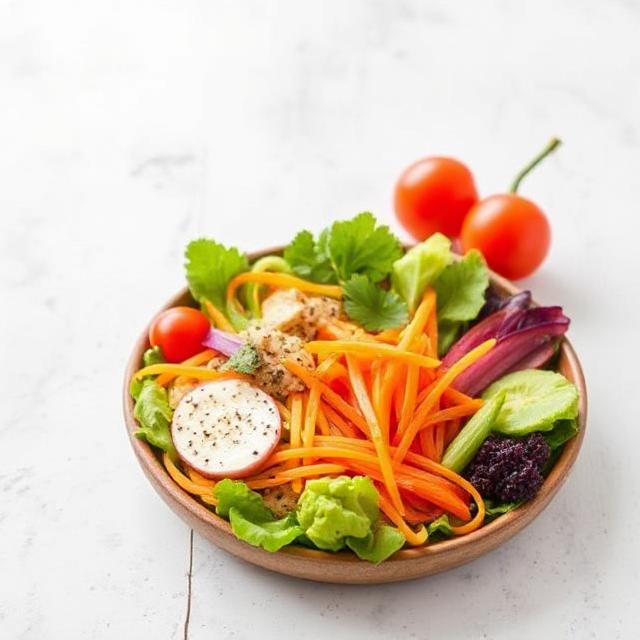
Table of Contents
Plant-Based Gluten Free Meals for Heart Health
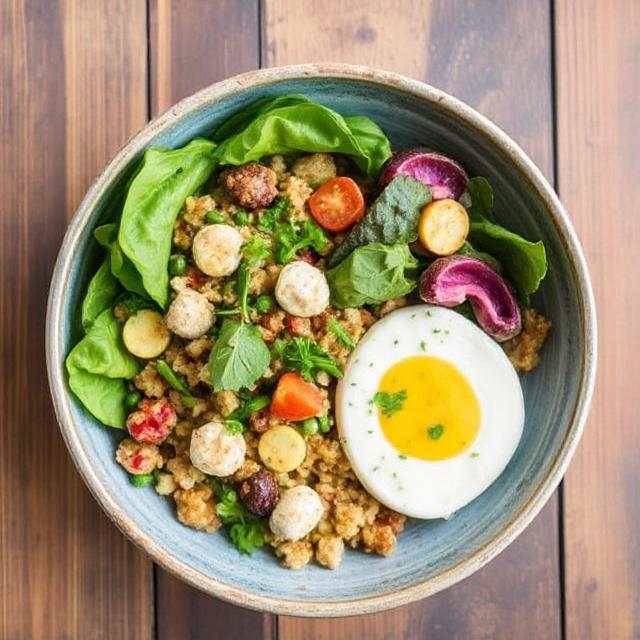
Why it matters:
Plant-based diets are naturally low in saturated fats, which help lower bad cholesterol (LDL). When you include gluten-free options, you can avoid inflammation triggers, which is very beneficial for gluten-sensitive people. These meals not only make the heart healthy but also improve digestion. So, both plant-based and gluten-free diets are very beneficial for your overall heart health.
Meal examples with details:
Quinoa Veggie Buddha Bowl
This wholesome bowl is loaded with protein, magnesium, and fiber. You can add seasonal vegetables, sprouts, and nuts, which are good for the heart. This dish is also gluten-free and is a complete meal that will give you energy.
Red Lentil Dal with Brown Rice
This traditional Indian dish is gluten-free and a good source of plant-based protein. You can also enhance the flavor by adding spices like garlic, turmeric, and cumin. Brown rice is rich in fiber and minerals, which help in lowering cholesterol.
Roasted Chickpea & Kale Salad
This crunchy, filling salad is packed with cholesterol-lowering fiber. With roasted chickpeas and fresh kale, you can apply a simple dressing of lemon juice and olive oil. This salad is not only tasty, but also very beneficial for the heart.
Quick tip:
Prepare large batches on your weekends, so that you have a chance to avoid cholesterol-raising takeout or fast food in between the day. This way, healthy and gluten-free plant-based meals will be at your fingertips, and you can easily manage your health.
Infographic:
“Top 5 Gluten-Free Grains for a Healthy Heart” — including quinoa, buckwheat, millet, certified gluten-free oats & sorghum.
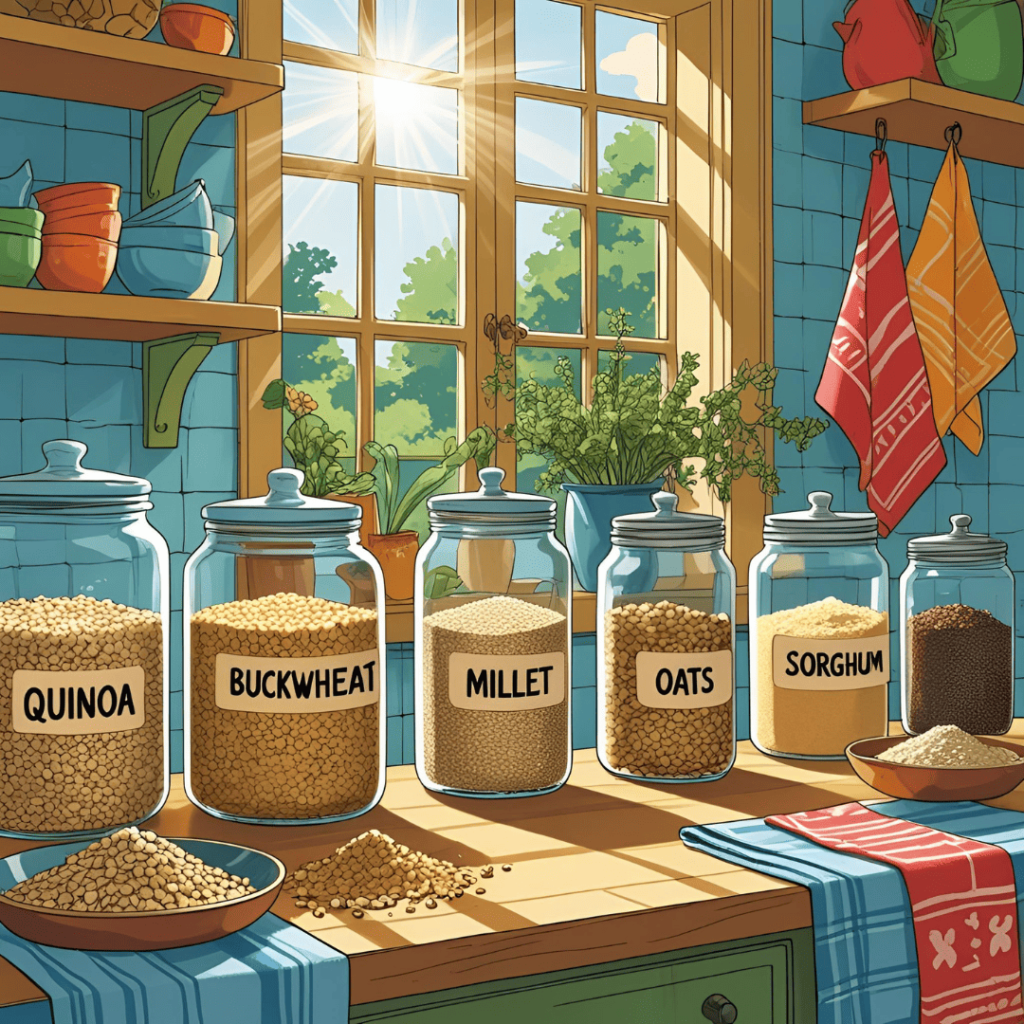
Cholesterol Lowering Vegetarian Recipes Gluten Free
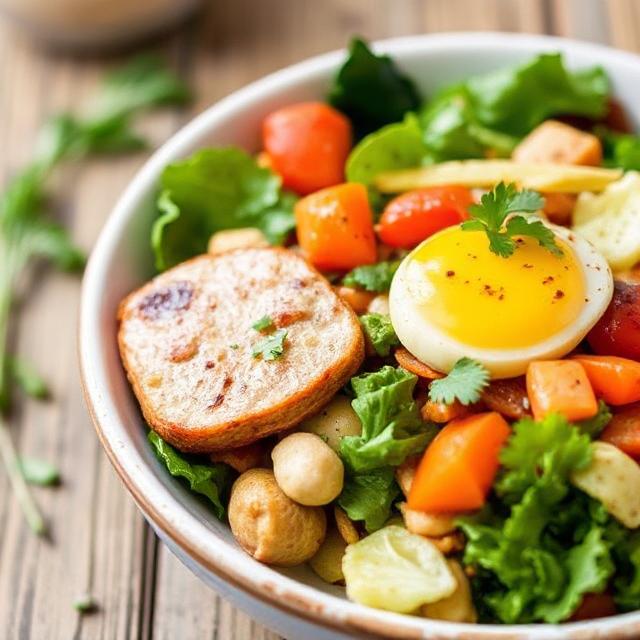
Why these recipes matter:
Specific, healthy recipes reduce the guesswork, and help you easily achieve your heart health goals. When you use heart-friendly ingredients, you know that every meal you eat helps naturally lower cholesterol. Regularly following healthy, gluten-free vegetarian recipes will not only keep your cholesterol levels under control, but will also improve your digestion and overall energy. So, it’s important to have tailored recipes so you can consistently follow your diet plan.
3 delicious, simple recipes:
Banana-Oat Pancakes (certified GF oats, egg or flax egg, almond milk)
These fiber-rich pancakes are satisfying and help reduce cholesterol. Oats are naturally packed with soluble fiber, which reduces LDL (bad cholesterol). Made with banana and almond milk, these pancakes are naturally sweet and creamy, and a perfect choice for breakfast.
“Want to start your day with heart-healthy, gluten-free oats? Try Bob’s Red Mill Gluten Free Organic Oats on Amazon!”
For the best results, use certified gluten-free oats like Bob’s Red Mill.
Spicy Chickpea Lettuce Wraps
High in plant protein, low in carbs, and gluten-free! It has a combination of roasted chickpeas, fresh lettuce leaves, and spices that make for a tasty and healthy snack or light meal. These wraps not only lower cholesterol but also improve digestion.
Green Smoothie Bowl
Made with spinach, avocado, chia seeds, and almond milk, this smoothie bowl is creamy, filling, and LDL-fighting. It contains antioxidants and healthy fats that are great for heart health. You can garnish it with nuts, berries, or seeds for extra nutrition.
Cooking pro-tip:
Use herbs like turmeric and garlic—both are proven to support heart health. Turmeric has anti-inflammatory properties, and garlic naturally lowers cholesterol levels. Incorporating these spices into your daily cooking is a simple and effective way to follow a heart-friendly diet.
Real case study:
Let me share a successful example: A person followed these recipes for 6 weeks, and his cholesterol chart improved significantly. Earlier his LDL level was high, but within 6 weeks it decreased by 20%! This case study will motivate you that with the right recipes and consistent effort, you too can easily control your cholesterol levels. (Source: NIH)
High Fiber Gluten Free Vegetarian Foods
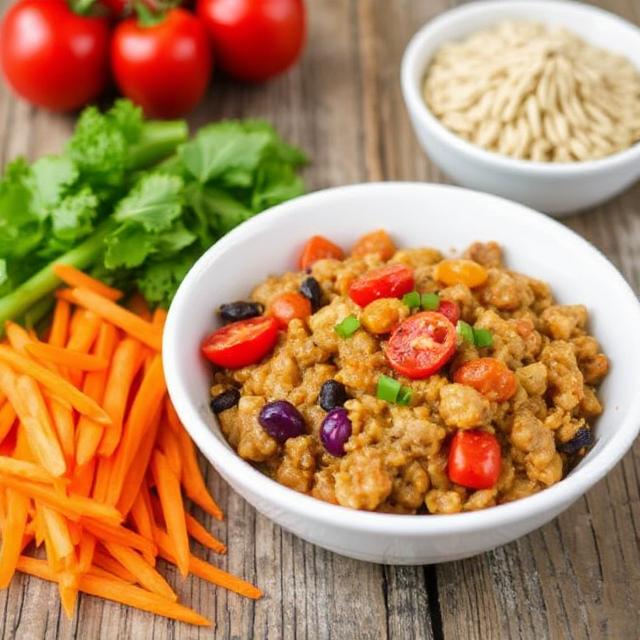
Why fiber is your best friend:
Soluble fiber binds with cholesterol in your gut and then helps flush out the body — like a cleaning crew keeping the arteries clean! Fiber not only improves digestion, but is also very beneficial for heart health. Eating high-fiber foods regularly naturally lowers your cholesterol levels and improves your overall health.
Top high-fiber gluten-free foods:
- Lentils (15g fiber per cup) – Loaded with protein and fiber, it makes your meals hearty and helps control cholesterol.
- Black beans (15g fiber per cup) – Rich in fiber, low fat and heart-friendly.
- Chia seeds (10g fiber per 2 tbsp) – Tiny but powerful! These seeds are full of fiber, omega-3 fats, and antioxidants.
- Certified GF oats (4g fiber per half cup) – Good source of soluble fiber, which reduces cholesterol naturally.
Practical ideas:
- Add ground flaxseed to smoothies for extra fiber.
- Make healthy pancakes with chickpea flour — gluten-free and fiber-rich!
- Sprinkle roasted lentils on salads for crunch and nutrition.
✅ Myth-buster box:
“Gluten-free = Healthy by default!” — This is wrong! Many gluten-free packaged foods have less fiber and more starch. So, always focus on whole, naturally gluten-free foods. It is best to include foods like fresh lentils, beans, seeds, and oats in your diet so that your health remains strong and balanced.
Healthy Fats for Vegetarians on Gluten Free Diet
Why healthy fats are important for you:
Healthy fats not only increase your good cholesterol (HDL) but also reduce bad cholesterol (LDL). These fats also keep you full for a long time, boost energy, and make a healthy diet without gluten or animal products. Healthy fats will also keep your heart strong and help you in weight management.
Best healthy fats:
- Avocados – Packed with 70% monounsaturated fat, this creamy and tasty fruit is very beneficial for the heart.
- Walnuts – A powerhouse of Omega-3 fatty acids, which is great for your ticker.
- Flaxseed & Chia Seeds – Double benefit of Omega-3 along with fiber — perfect combo for digestion and heart health.
- Olive Oil – Proven to reduce LDL (bad cholesterol), especially when used instead of butter or ghee.
Snack ideas:
- Serve mashed avocado over gluten-free rice cakes — a tasty and healthy snack.
- Make a trail mix with almonds, walnuts, and dark chocolate chips (in moderation) — it boosts energy and keeps cholesterol under control.
Pro tip:
Substitute olive oil instead of butter or ghee when roasting veggies — simple swaps can make a huge difference in your cholesterol levels! Incorporating healthy fats into your daily cooking is a simple and effective step that will help strengthen your heart and health long-term.
“Want a personalized plan? Try our Free AI Diet Generator to build your own gluten-free vegetarian cholesterol-lowering meal plan — instantly!”
Reputable & Trust-worthy Sources
British Heart Foundation
Physicians Committee for Responsible
Practical Tips & Important Information for a Heart-Healthy, Gluten-Free Vegetarian Diet
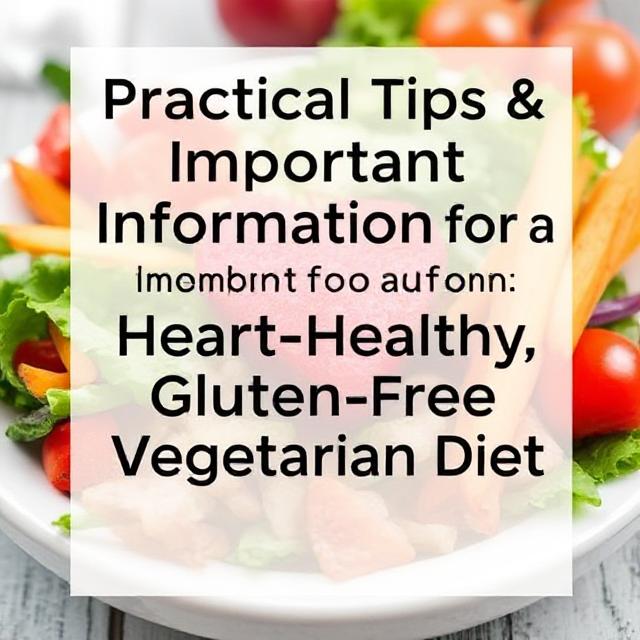
1. Focus on Whole, Unprocessed Foods
Processed gluten-free snacks and ready-to-eat foods often contain preservatives, added sugars, and unhealthy fats. So, include as many whole foods as possible in your diet as possible, such as fruits, vegetables, nuts, seeds, whole grains, and legumes.
2. Read Food Labels Carefully
Regardless of being labeled gluten-free, it’s important to check the ingredients list. Read food labels carefully to avoid hidden gluten or unhealthy additives.
3. Incorporate Fiber-Rich Foods Daily
Fiber helps reduce cholesterol and improves digestion. Include oats, barley, chia seeds, flaxseeds, beans, lentils, and fresh fruits and vegetables in your daily diet.
4. Use Heart-Healthy Cooking Oils
Use olive oil, avocado oil, or mustard oil for cooking. These oils contain healthy monounsaturated and polyunsaturated fats, which are beneficial for the heart.
5. Limit Intake of Processed Snacks and Sweets
Make your diet clean and nutritious by avoiding excessive processed snacks, fried foods, and sugary desserts. Try healthy alternatives like roasted nuts, fresh fruits, and homemade snacks.
6. Regular Physical Activity
Along with diet, regular exercise is also very important. Activities like walking, yoga, cycling can support your overall heart health.
7. Stay Hydrated
Drinking adequate water is important for your digestion and metabolism. Herbal teas and fresh fruit juices also help with hydration, but avoid added sugars.
8. Plan Your Meals in Advance
Weekly meal planning will help you make healthy, fiber-rich, and gluten-free options. This can help you avoid unhealthy temptations and develop consistent healthy eating habits.
9. Limit Salt Intake
Excess salt can increase the risk of high blood pressure. Use herbs and spices to make your dishes flavorful without excessive salt.
10. Keep Healthy Snacks Handy
Whenever you’re hungry, have healthy snacks like nuts, seeds, roasted chickpeas, or fresh fruits. This will reduce junk food cravings and allow you to make healthier choices.
11. Be Mindful of Portion Sizes
Portion control helps you manage your calorie intake, which is also important for weight management. Eating small, frequent meals is also a good option.
12. Consult a Nutritionist or Dietitian
If you have specific health issues, it is best to consult a registered dietitian. You can create a personalized diet plan according to your needs.
Important Information
- Gluten-Free Does Not Mean Healthy Always: Gluten-free processed foods may contain unhealthy fats, sugars, and preservatives. Always opt for natural, whole, unprocessed foods.
- Cholesterol and Fats: Not all fats are bad. Healthy fats, such as monounsaturated and polyunsaturated fats, help control cholesterol.
- Vegetarian Diet and Protein: Plant-based sources like lentils, chickpeas, tofu, nuts, and seeds are good sources of protein, which are essential for muscle health and overall well-being.
- Monitoring Cholesterol Levels: Monitor your cholesterol levels with regular health check-ups so that you can make necessary changes in your diet.
FAQs for Healthy Fats & Gluten-Free Vegetarian Diet
1. What are healthy fats and why are they important for vegetarians?
Healthy fats, such as monounsaturated and polyunsaturated fats, are very beneficial for your heart health. They lower bad cholesterol (LDL) and increase good cholesterol (HDL) and boost energy levels. For vegetarians, these fats come from plant-based sources that are also gluten-free.
2. Are avocados good for heart health?
Yes, avocados are full of monounsaturated fats, which are very good for the heart. They lower bad cholesterol and support overall heart health.
3. Can vegetarians lower their cholesterol naturally?
Absolutely! You can control your cholesterol levels naturally by including fiber-rich foods like oats, flaxseed, chia seeds, and healthy fats like nuts, seeds, and olive oil in your diet.
4. What are the best sources of omega-3 for vegetarians?
Good sources of omega-3 for vegetarians are flaxseed, chia seeds, walnuts, and hemp seeds. These fatty acids are very important for both your brain and heart health.
5. How can I incorporate healthy fats into my gluten-free diet?
You can include foods like avocados, nuts, seeds, olive oil, and gluten-free oats in your daily diet. Trail mix, avocado toast, or roasted vegetables with olive oil are also good options for a snack.
6. Are gluten-free crackers healthy?
Gluten-free crackers are often processed, so they may contain added preservatives and refined ingredients. So, it’s better to choose fiber-rich and natural snack options instead.
7. Can eating healthy fats help in weight management?
Yes, healthy fats keep you full for longer, which prevents overeating. Along with proper portion control, these fats can help in weight management.
8. Is olive oil better than butter or ghee?
Yes, olive oil is rich in monounsaturated fats that lower LDL cholesterol, while butter and ghee contain saturated fats that can be harmful to the heart. So, olive oil is a healthier choice for cooking.
9. Are there any side effects of consuming too much healthy fat?
Yes, excessive quantity of anything can cause health issues. Healthy fats should be eaten in moderation. Overconsumption can also lead to weight gain.
10. How can I make my meals more fiber-rich and heart-healthy?
You can make your meals more fiber-rich and heart-healthy by incorporating whole grains, oats, chia seeds, flaxseeds, fruits, vegetables, nuts, and seeds into your diet.
11. What are some quick gluten-free, healthy snack ideas?
Rice cakes with avocado, nuts and dark chocolate trail mix, roasted chickpeas, fresh fruits, and vegetable sticks with hummus are quick and healthy snacks.
12. Is a gluten-free diet necessary for everyone?
Not just for people who suffer from gluten intolerance, celiac disease, or gluten sensitivity. A healthy gluten-free diet can also be beneficial for people who want to improve their overall health.
Conclusion
You never have to feel like a gluten-free diet is limited to eating cardboard-flavored crackers or boring salads. With these simple, fiber-rich meals and heart-friendly healthy fats, you can naturally lower your cholesterol levels and enjoy your dinner.
Remember, your heart — and your taste buds — both deserve better things! This journey of healthy eating is not only beneficial for your health, it will also make you feel happy and energized. So, add variety to your diet, eat flavorful foods, and give love to your heart – because a healthy lifestyle is the key to real happiness!
🔗 Related Posts You’ll Love:
Affiliate Disclosure
This blog contains affiliate links, meaning I may earn a small commission if you purchase through these links, at no extra cost to you. I only recommend products I trust and believe will benefit my readers. Your support helps keep this site running—thank you! 🙌

About the Author
Irshad Quadri is a Health & Wellness blogger who simplifies topics like cholesterol management, weight loss, and heart health for everyday readers. On iq4u81.blog, he shares science-backed diet tips, easy recipes, and practical guides to help people live healthier — without losing the joy of food.

